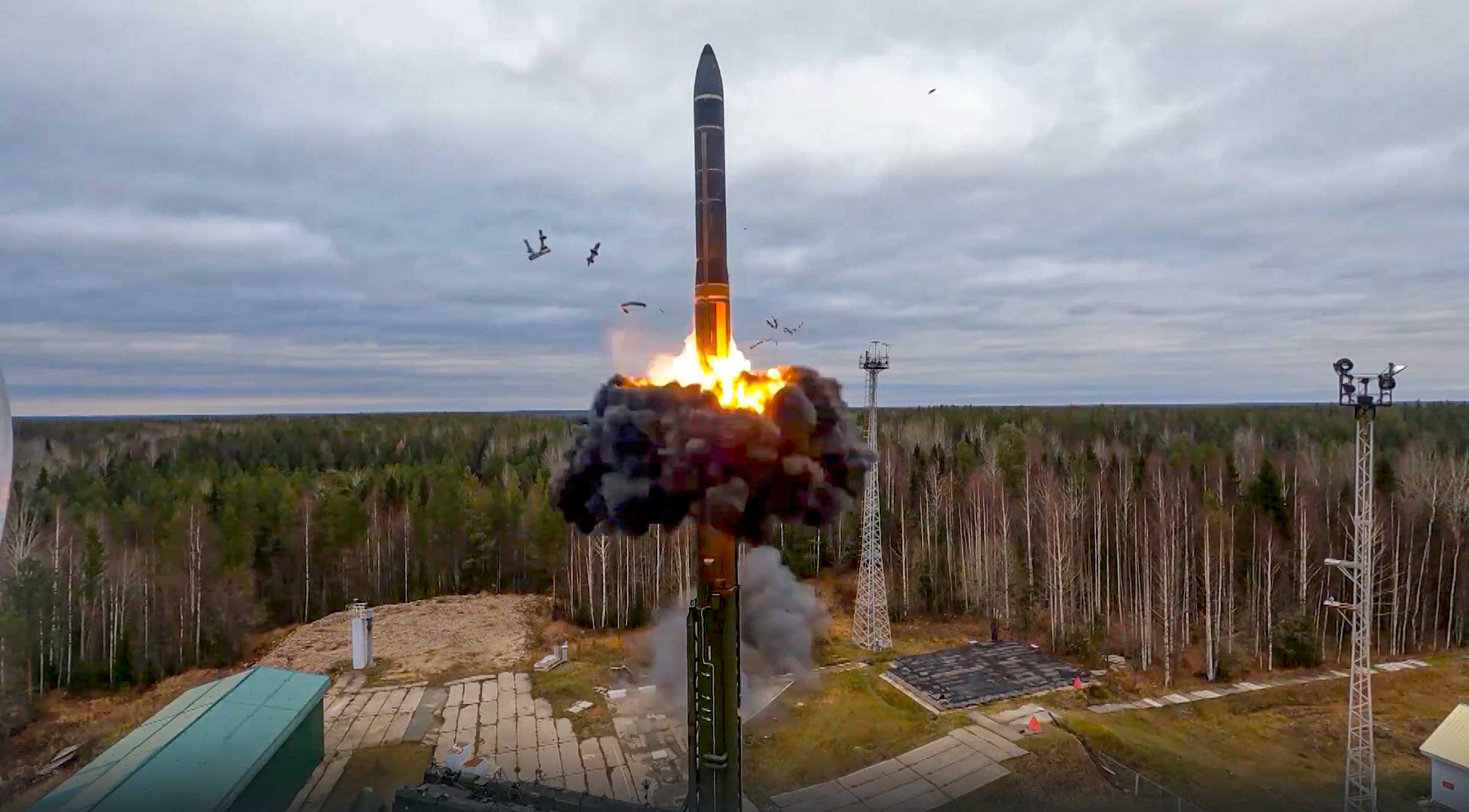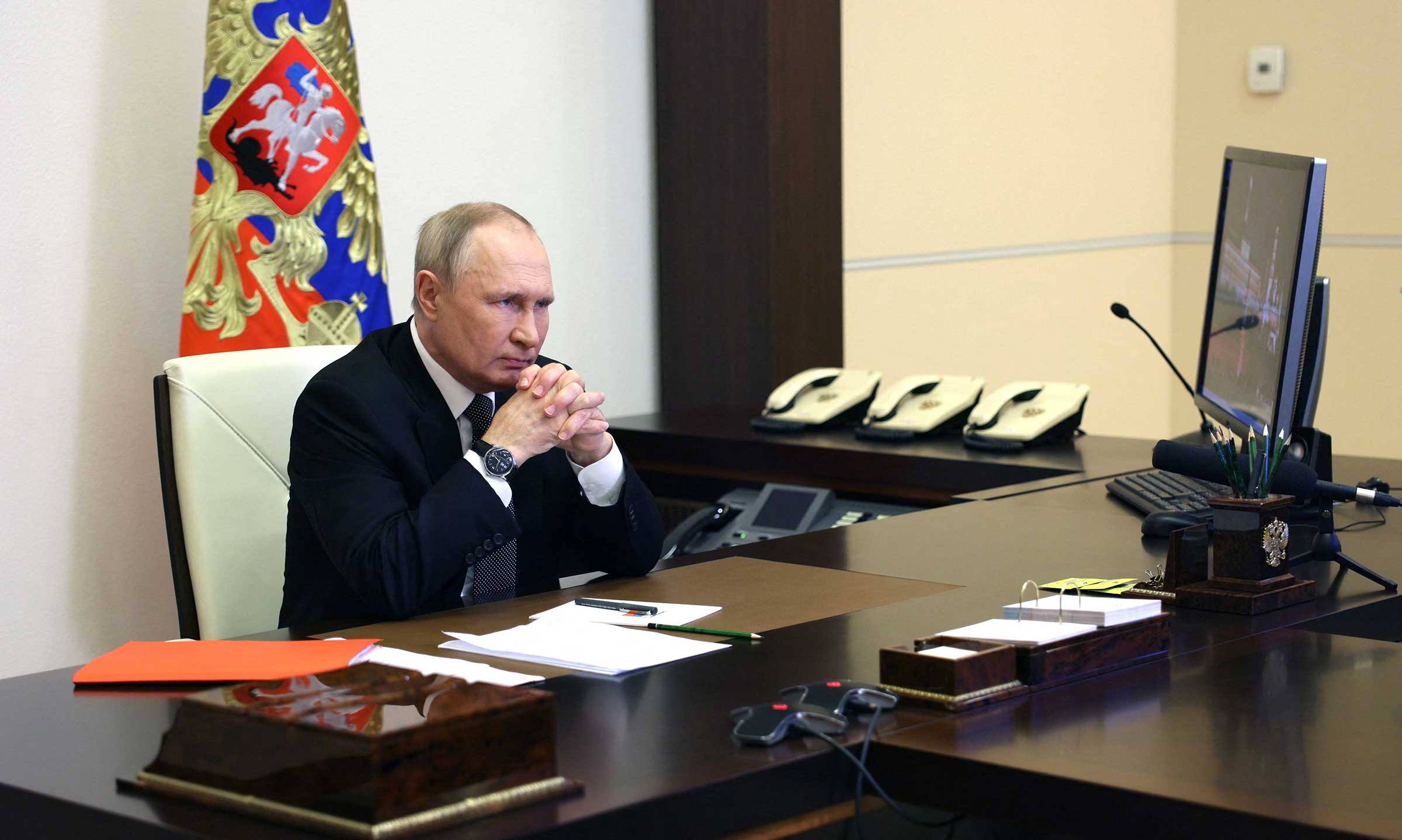
As Putin threatens to strike Ukraine with tactical nuclear weapons and Biden warns that this risks escalation to nuclear Armageddon, many observers have wondered aloud whether the septuagenarian or the octogenarian or both have lost touch with reality. Pundits declare Putin’s threats “irrational,” since according to them no rational leader could order a nuclear strike on another state. Critics of Biden have seized on his references to nuclear annihilation, for example when he recently said that “for the first time since the Cuban Missile Crisis, we have a direct threat of the use of nuclear weapons” which “could end in Armageddon,” as decisive evidence of senility.
Even observers less judgmental about Biden and Putin have dismissed these two leaders’ talk about nuclear weapons and war as a throwback to the last century. Having come of age since the Cold War ended with the collapse of the Soviet Union, many imagined that nuclear weapons had somehow been relegated to the dustbin of history when we buried the Evil Empire. After more than seven decades without the use of nuclear weapons in war, foreign policy experts assert that a “nuclear taboo” has made any use of nuclear weapons “inconceivable”—failing to recognize that when one declares something to be inconceivable, that is a statement not about what is possible, but about what one’s mind can conceive.
Thankfully, Americans have a president and national security team who know better. As the individual who understands Putin best, CIA Director Bill Burns, has repeatedly stated, Putin’s threat to conduct a nuclear strike is deadly serious. Why has the Biden administration gone to such extraordinary lengths to prevent Putin from conducting such a strike? Because they understand that this really would set in motion a dangerous spiral that could end in full-scale nuclear war.
Read More: Ukraine’s Winter Offensive Could Decide the War
To begin to appreciate what President Biden, Chairman of the Joint Chiefs of Staff Mark Milley, CIA Director Bill Burns, and National Security Advisor Jake Sullivan understand that most of the press and talking heads who have been discounting nuclear risks posed by the war in Ukraine don’t, it is useful to consider answers to seven questions.
First: could Putin rationally order a nuclear strike on Ukraine? Unquestionably yes: as rationally as U.S. President Harry Truman dropped the first atomic bomb on Hiroshima in 1945, killing 140,000 Japanese. Indeed, Truman ordered a second strike on Nagasaki three days later—after which Japan’s emperor surrendered.
Second: would Putin’s nuclear attack on Ukraine be a step onto a moving escalator that could end with nuclear bombs destroying American and Russian cities? Yes: Putin certainly commands a nuclear arsenal as deadly as the one wielded by leaders of the Soviet Union in the Cold War. If he strikes a Ukrainian city with a Hiroshima-sized nuclear bomb, the U.S. has made it clear that it will respond in a way that has “catastrophic consequences” for Russia. While the U.S. response would almost certainly not include a retaliatory nuclear strike on Russia, it could mean attacking Russian military forces in Ukraine, which could lead to further Russian nuclear attacks on Ukraine. And then? “Limited” nuclear war is a possibility that fascinated Cold War theorists in the 1960s. But in hundreds of simulations of war games in which national security experts attempted to explore that option, rarely was it possible to avoid full-scale war.
Third: under what conditions would Putin be more likely than not to order a nuclear strike? Answer: if conditions on the battlefield force him to choose between a humiliating defeat, on one hand, and a nuclear attack that offers even a slim chance of an acceptable outcome to his war, on the other. If Zelensky succeeds in his current objective to liberate every square inch of Ukraine seized by Russia, including Crimea, this decisive defeat of Putin’s armies would not pose an existential threat to Russia. It would, however, pose an existential threat to Putin’s rule. If he is forced to choose between a humiliating loss and conducting a nuclear strike, I am prepared to give odds that he will choose the latter.
Instructively, having successfully led the U.S. through the most dangerous crisis in recorded history—the Cuban Missile Crisis of 1962–President John F. Kennedy came away from that searing experience with a major lesson that he passed to his successors. As he said in his most important foreign policy speech delivered just five months before he was assassinated: “Above all, while defending our own vital interests, nuclear powers must avert those confrontations that bring that force an adversary to choice of either a humiliating retreat or a nuclear war.”

Fourth: do Russia’s current nuclear posture, doctrine, and exercises include the first use of tactical nuclear weapons? Answer: yes. Russia’s national security strategy includes a doctrine they call “escalate to deescalate.” To counter a large-scale conventional attack on Russia, their exercises simulate tactical nuclear first strikes against an adversary to force it to stop rather than risking further escalation. To make this a feasible option, Russia’s arsenal includes 1,900 tactical nuclear weapons designed for use on the battlefield or at shorter range. If used, many of these would have an explosive impact equivalent to the bomb the U.S. dropped on Hiroshima.
Fifth: why are there no U.S. troops fighting on the battlefield alongside brave Ukrainians resisting Russian aggression? Why has the U.S. not been prepared to threaten to retaliate against a Russian nuclear strike on Ukraine with an equivalent nuclear attack on Russia? Answer: because as President Biden has said from the outset of the crisis, “we will not fight World War III for Ukraine.” The brute fact that Biden knows, but that many of those now demanding that he move more forcefully against Putin have conveniently forgotten or want to deny, is that in relations with Putin’s Russia, the U.S. continues to survive in a MAD world. MAD—mutual assured destruction—is the acronym strategists created to capture the essence of the condition in which two adversaries have such robust nuclear arsenals that neither can attack the other without suffering a retaliatory response that destroys itself.
Read More: The Fight for a Future Free of Nuclear Weapons
Sixth: why in these conditions did President Ronald Reagan declare: “a nuclear war cannot be won and must therefore never be fought?” Because if the price of a war that completely destroys the enemy is the destruction of one’s own society, as Reagan insisted, “no one could call that a victory.” When facing this reality, a nuclear war must never be fought—because doing so would result in the loss of America’s most vital national interest: the survival of the U.S. as a free nation.
Seventh: does the imperative of not fighting a war with a nuclear-armed adversary require passivity when it acts in ways that challenge our interests? Answer: no. But these conditions do create a demand for extraordinary strategic imagination. In the aftermath of World War II, U.S. policymakers found themselves facing a revolutionary expansionist Soviet Union they believed was in their words as “incompatible with democracy as Nazism or fascism.” Statesmen we now honor as the “wise men” developed a strategy for what came to be called the “Cold War.” “Cold” War included a determined effort to defeat and undermine the Soviet adversary by every means possible except one—bombs and bullets wielded by uniformed members of the U.S. military killing uniformed members of the Soviet military. Thus the U.S. engaged in economic warfare, political war, proxy wars, and every other means it could mobilize—while always stopping short of direct attack on Soviet troops.
In crafting a strategy that is now defeating Putin’s attempt to erase Ukraine from the map, the Biden Administration has drawn from the earlier playbook. It has organized comprehensive Western sanctions that are crippling Russia’s economy; provided arms, training, intelligence, and other support for Ukrainians on the battlefield; and given the Zelensky government unprecedented levels of economic aid. While it is too soon to offer judgements about the outcome of the war, at this point it seems likely that when the intense fighting subsides, Ukraine will emerge as a free, independent, vibrant nation; Putin’s war will be seen by all to have been a colossal strategic blunder; NATO will have been revived and stand strong against future Russian aggression; and most importantly, there will have been no nuclear war.
More Must-Reads from TIME
- Cybersecurity Experts Are Sounding the Alarm on DOGE
- Meet the 2025 Women of the Year
- The Harsh Truth About Disability Inclusion
- Why Do More Young Adults Have Cancer?
- Colman Domingo Leads With Radical Love
- How to Get Better at Doing Things Alone
- Michelle Zauner Stares Down the Darkness
Contact us at letters@time.com